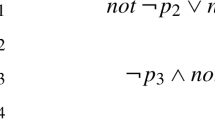Abstract
A method is presented for computing minimal answers of the form \(\bigvee {\cal A}\) in disjunctive deductive databases under the disjunctive stable model semantics. Such answers are constructed by repeatedly extending partial answers. Our method is complete (in that every minimal answer can be computed) and does not admit redundancy (in the sense that every partial answer generated can be extended to a minimal answer), thus no non-minimal answer is generated. The method does not (necessarily) require the computation of models of the database in their entirety. A partitioning of the database into extensional and intensional components is employed in order to overcome the problems caused by the possible non-existence of disjunctive stable models, and a form of compilation is presented as a means of simplifying and improving the efficiency of the run-time computation, which then reduces to relatively trivial processing within the extensional database. In addition, the output from this compilation process has the significant advantage of being immune to updates to the extensional database. Other forms of database pre-processing are also considered, and three transformations are presented mapping a database onto an equivalent positive database, non-disjunctive database, and set of conditional facts.
Similar content being viewed by others
References
Ben-Eliyahu, R., Dechter, R.: Propositional semantics for disjunctive logic programs. Ann. Math. Artif. Intell. 12, 53–87 (1994)
Brass, S., Dix, J.: A general approach to bottom-up computation of disjunctive semantics. In: Dix, J., Pereira, L., Przymusinski, T. (eds.) Non-Monotonic Extensions of Logic Programming, Springer Lecture Notes in Artificial Intelligence, vol. 927, pp. 127–155. Springer, Berlin (1995)
Cadoli, M., Donini, F.M.: A survey of knowledge compilation. AI Commun. 10, 137–150 (1997)
Dung, P.M.: On the relations between stable and well-founded semantics of logic programs. Theor. Comp. Sci. 105, 7–25 (1992)
Eiter, T., Gottlob, G.: The computational cost of disjunctive logic programming. Ann. Math. Artif. Intell. 15, 289–323 (1995)
Eiter, T., Gottlob, G., Mannila, H.: Disjunctive datalog. ACM Trans. Database Syst. 22, 364–418 (1997)
Fernández, J., Minker, J., Yahya, A.: Computing perfect and stable models using ordered model trees. Comput. Intell. 11, 89–112 (1995)
Fernández, J., Minker, J.: Bottom-up computation of perfect models for disjunctive theories. J. Logic Program. 25, 33–51 (1995)
Gelfond, M., Lifschitz, V.: The stable model semantics for logic programming. In: Kowalski, R., Bowen, K. (eds.) Proceedings 5th International Conference on Logic Programming, Seattle, pp. 1070–1080 (1988).
Grant, J., Minker, J.: Answering queries in indefinite databases and the null value problem. Adv. Comput. Res. 3, 247–267 (1986)
Henschen, L.J., Park, H.: Compiling the GCWA in indefinite databases. In: Minker, J. (ed.) Foundations of Deductive Databases, pp. 395–438. Morgan Kaufmann, San Francisco (1988)
Janhunen, T., Niemelä, I., Seipel, D., Simons, P., You, J.H.: Unfolding partiality and disjunctions in stable model semantics. In: Cohn, A.G., Giunchiglia, F., Selman, B. (eds.) Proceedings of the 7th International Conference on the Principles of Knowledge Representation and Reasoning, pp. 411–419. Morgan Kaufmann, San Francisco (2000).
Johnson, C.A.: On computing minimal and perfect model membership. Data Knowl. Eng. 18, 225–276 (1996)
Johnson, C.A.: Deduction trees and the view update problem in indefinite deductive databases. J. Autom. Reason. 19, 31–85 (1997)
Johnson, C.A.: Top down query processing in indefinite deductive databases. Data Knowl. Eng. 26, 1–36 (1998)
Johnson, C.A.: Extended deduction trees and query processing. Keele University technical report TR98-07. www.tech.plym.ac.uk/soc/staff/chrisjohnson/tr95.html (2008)
Johnson, C.A.: On cyclic covers and perfect models. Data Knowl. Eng. 31, 25–65 (1999)
Johnson, C.A.: Processing deductive databases under the disjunctive stable model semantics. Fundam. Inform. 40, 31–51 (1999)
Johnson, C.A.: Processing indefinite deductive databases under the possible model semantics. Fundam. Inform. 49, 325–347 (2002)
Johnson, C.A.: Computing only minimal answers. Technical report. www.tech.plym.ac.uk/soc/staff/chrisjohnson/minimal/minimal.pdf (2008)
Johnson, C.A.: Query compilation under the disjunctive well-founded semantics. Fundam. Inform. 62, 343–368 (2004)
Lobo, J., Minker, J., Rajasekar, A.: Foundations of Disjunctive Logic Programming. MIT, Cambridge (1992)
Leone, N., Rullo, P., Scarcello, F.: Disjunctive stable models: unfounded sets, fixpoint semantics and computation. Inf. Comput. 135, 69–112 (1997)
Leone, N., Pfeifer, G., Faber, W., Eiter, T., Gottlob, G., Perri, S., Scarcello, F.: The DLV system for knowledge representation and reasoning. arxiv.org/abs/cs.AI/0211004 (2004)
Minker, J.: On indefinite databases and the closed world assumption. In: Loveland, D.W. (ed.) Proceedings of the 6th Conference on Automated Deduction, Springer Lecture Notes in Computer Science, vol. 138, pp. 292–308. Springer, Berlin (1982)
Papadimitriou, C., Yannakakis, M.: The complexity of facets (and some facets of complexity). J. Comput. Syst. Sci. 28, 244–259 (1994)
Przymusinski, T.: On the declarative semantics of deductive databases and programs. In: Minker, J. (ed.) Foundations of Deductive Databases and Logic Programming. Morgan Kauffman, San Francisco (1988)
Przymusinski, T.: Stable semantics for disjunctive databases. New Gener. Comput. 9, 401–424 (1991)
Rajasekar, A.: Semantics for Disjunctive Logic Programs. PhD Thesis, University of Maryland (1989)
Simons, P.: Extending and Implementing the Stable Model Semantics. Doctoral Dissertation. Research Report 58. Helsinki University of Technology, Helsinki (2000)
Simons, P., Niemelä, I., Soininen, T.: Extending and implementing the stable model semantics. Artif. Intell. 138, 181–234 (2002)
Simons, P., Syrjänen, T.: SMODELS and LPARSE—a solver and a grounder for normal logic programs. www.tcs.hut.fi/Software/smodels/ (2008)
Van Gelder, A., Ross, K., Schlipf, J.S.: The well-founded semantics for general logic programs. J. Assoc. Comput. Mach. 38, 620–650 (1991)
Yahya, A., Fernández, J., Minker, J.: Ordered model trees: a normal form for disjunctive deductive databases. J. Autom. Reason. 13, 117–143 (1994)
Yahya, A.: A goal-driven approach to efficient query processing in disjunctive databases. Technical Report PMS-FB-1996-12. Institut für Informatik, Ludwig Maximilians Universität, München (1996)
Yahya, A.: Duality for efficient query processing in disjunctive deductive databases. J. Autom. Reason. 28, 1–34 (2002)
Author information
Authors and Affiliations
Corresponding author
Rights and permissions
About this article
Cite this article
Johnson, C.A. Computing Only Minimal Answers in Disjunctive Deductive Databases. J Autom Reasoning 42, 35–76 (2009). https://doi.org/10.1007/s10817-008-9106-5
Received:
Accepted:
Published:
Issue Date:
DOI: https://doi.org/10.1007/s10817-008-9106-5




